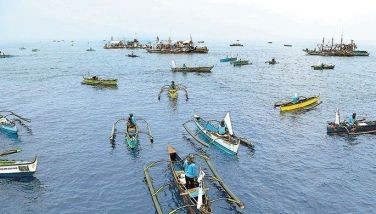Phl to China: Join us in UN arbitration
MANILA, Philippines - Joining a United Nations arbitration process to resolve territorial disputes is the course of action China should take and not just meeting Manila “halfway†on a controversial fisheries regulation in disputed waters, the Department of Foreign Affairs (DFA) said yesterday.
“The nine-dash line claim is in gross violation of international law. It is the core issue that must be singularly and fully addressed,†DFA spokesman Raul Hernandez said. “To this end, we reiterate our invitation to China to join us in arbitration as we intend to proceed with or without China for a final disposition.â€
He said the fisheries rule, which China’s Hainan province vowed to enforce on foreign fishing vessels “is only one of the unilateral measures by China to force a change in the regional status quo in order to advance its nine-dash line position of undisputed sovereignty over nearly the entire South China Sea.â€
The new fisheries law sparked condemnation from China’s neighbors as well as from the United States, which called it provocative. The fisheries regulation requires all foreign fishing vessels to obtain approval from Chinese authorities before transiting into Hainan’s administrative zone in the South China Sea for fishing or surveying activities.
On Friday, Chinese foreign ministry spokesman Hong Lei said China was always willing to make efforts to resolve the issue through talks.
Hernandez said that way back in 2001, the Philippines had made clear to China that the two countries could proceed with their bilateral agenda even while dealing separately with contentious issues, particularly maritime disputes.
“This became the content of a signed declaration between the Philippine and Chinese presidents then. We are hopeful for adherence to that agreement,†he added.
The Philippines called on the Association of Southeast Asian Nations (ASEAN) on Friday to “maintain regional solidarity†in the face of unilateral actions by China to change the status quo to advance its maritime interests.
At the ASEAN Foreign Ministers’ Retreat in Bagan, Myanmar which concluded yesterday, Foreign Affairs Secretary Albert del Rosario said China’s new fishing regulation in the South China Sea, as well as its establishment of an Air Defense Identification Zone (ADIZ) over East China Sea were proof of Beijing’s brazen disregard for international laws like the United Nations Convention on the Law of the Sea or UNCLOS.
He said China’s actions threaten regional stability and are contrary to the ASEAN-China Declaration on the Conduct of Parties.
The ADIZ over East China Sea – particularly over areas Beijing is disputing with Japan – similarly obligates aircraft flying through the zone to provide identification and follow instructions or face “defensive emergency measures†from China’s armed forces.
Del Rosario said that ASEAN’s effort to manage tensions in the region by coming out with a Code of Conduct in the South China Sea (COC) might be undermined if Beijing is allowed to alter the status quo.
The ASEAN meet in Bagan, which kicked off last Jan. 15, was the first high-level meeting under Myanmar’s chairmanship of ASEAN in 2014. It was the first time for Myanmar to chair ASEAN since joining the 10-member bloc in July 1997.
Positive development
Presidential spokesman Edwin Lacierda, for his part, said they welcomed China’s willingness to dialogue on its new fishing rules but clarified it was the Philippines which set the tone for discussion by seeking clarification from Beijing.
“Certainly it is good to have a dialogue. We made the first move, we asked them, we wanted to seek clarification,†Lacierda said over dzRB.
“We’re precisely talking about international waters, about our EEZ (exclusive economic zone). That’s why there was a need for clarification. It’s not surprising they want to dialogue with us,†he said.
The administration had made clear it would defy the so-called rules, even as it tasked government vessels to escort Philippine fishing boats venturing into areas within the country’s EEZ but which are being claimed by China
China’s Hong was quoted in news reports as saying that China was resolved to defend its sovereignty, but was ready to “put forth efforts to resolve the relevant issue through dialogue and consultations.â€
Meanwhile, party-list group Bayan Muna asked the House of Representatives yesterday to look into the new fishing law of China, which requires Filipinos to seek its permission before fishing in the West Philippine Sea.
In a resolution, Bayan Muna said China, in imposing a fishing permit requirement, violated the 2002 Declaration on the Conduct of Parties in the South China Sea it signed with the Philippines and other members of ASEAN.
It said the declaration aimed to ease tensions in the region and was intended to serve as a “foundation for future negotiations.â€
It noted that the declaration was signed following confrontations among countries claiming the Spratly Islands.
It said the DFA has described the fishing law as a violation of the UNCLOS, which gives coastal states the right to claim a 200-mile exclusive economic zone.
“Congress has the duty to look into this new Chinese fishing rule with the end in view of finding ways to de-escalate tensions and exploring possible solutions to the problem, especially those that may require legislation or even diplomatic initiatives involving members of the legislative branch in the claimant countries,†it said.
Palawan Rep. Franz Joseph Alvarez has said the fishing permit requirement, if followed, could jeopardize the country’s food security.
“It must be ignored by the Philippines, as it is not only illegal but it would worsen the country’s dipping fisheries catch. It would jeopardize our food security. It is a move to starve us,†he said.
He said fishing is a P225-billion-a-year industry in the country, directly employing eight million Filipinos.
Referring to the waters east of the Philippines, Alvarez stressed that what China claims “as its lake is our own fish pond.â€
“These rich fishing grounds are a primary source of fish and marine products we consume,†he said.
He said a Filipino family consumes about 38 kilos of fish a year.
Thus, he said China’s move to block the Filipino fishermen’s access to what is “traditionally, historically and legally our fishing ground will have food security implications, especially at a time when both our commercial and municipal fishing output is basically flat.â€
He pointed out that requiring Filipinos to get permits from China before going to their traditional fishing grounds “would have the effect of shutting down a major production line of our fishing industry.â€
“This is the context that China’s illegal move must be seen. The only consent that matters is the one coming from the Philippine government, and Malacañang has said we should ignore China’s new regulation,†he added. – With Aurea Calica, Jess Diaz
- Latest
- Trending






























